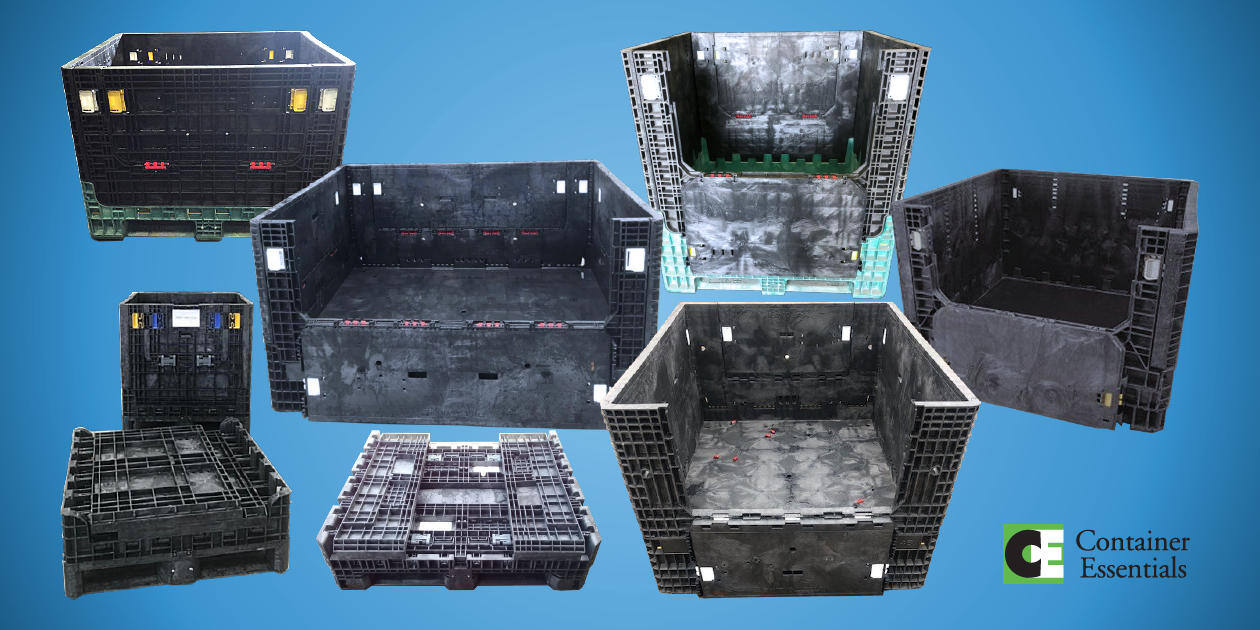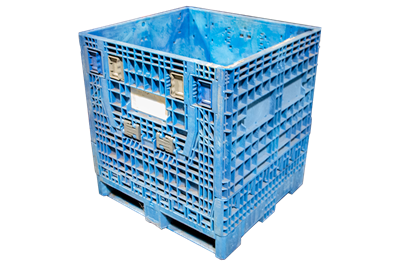Learn how used collapsible containers help optimize your supply chain flow
Wiki Article
Why Mass Containers Are Vital for Sustainable and Affordable Transportation
Bulk containers play an essential role in modern logistics. They assist in the effective activity of large quantities of goods, thus enhancing transport procedures. This method not only decreases expenses however likewise reduces environmental impact through reduced emissions and waste generation. As sectors seek even more sustainable methods, the adoption of mass containers is ending up being increasingly substantial. What implications does this change hold for future logistics and supply chain monitoring?
The Advantages of Utilizing Mass Containers in Logistics
Bulk containers reinvent logistics by improving effectiveness and sustainability. These containers permit the transportation of large quantities of products in a solitary journey, significantly minimizing the variety of journeys required. This not only streamlines operations however additionally minimizes labor costs connected with handling, packing, and discharging. On top of that, bulk containers are developed to maximize space application within transport vehicles, making certain that even more products can be shipped concurrently.The standardization of bulk containers also simplifies the logistics procedure. With consistent dimensions, they can be quickly stacked and kept, causing enhanced warehouse monitoring. Mass containers usually include resilient materials that protect materials from damages during transit, thus lowering product loss and raising general integrity. Therefore, businesses can experience improved supply chain efficiency, eventually bring about enhanced productivity and consumer contentment. This combination of aspects makes bulk containers a critical possession in modern logistics.
Environmental Impact: Decreasing Waste and Carbon Impact
As industries progressively focus on sustainability, the adoption of mass containers has actually arised as a key approach for decreasing waste and decreasing carbon footprints. These containers decrease the use of packaging products, such as boxes and plastic, thus especially decreasing total waste generation. By consolidating deliveries, bulk containers enhance transport efficiency, enabling more products to be delivered per trip. This reduction in journeys straight correlates with lower greenhouse gas exhausts, adding to a smaller carbon impact.In addition, mass containers can often be recycled or reused, even more mitigating environmental impact. The longevity of these containers guarantees they can endure multiple transport cycles, minimizing the demand for single-use options. used collapsible bulk containers. By enhancing logistics and advertising reliable source usage, bulk containers not only sustain lasting techniques yet additionally encourage industries to align with worldwide environmental goals. Inevitably, their execution reflects a commitment to ecological stewardship and responsible resource management
Cost Cost Savings: Exactly How Mass Containers Lower Transport Costs
While lots of business seek methods to enhance their bottom line, the usage of mass containers provides a significant possibility for reducing transportation expenditures. Mass containers optimize the volume of goods moved, enabling businesses to deliver larger amounts at the same time. This performance decreases the variety of trips called for, directly lowering fuel prices and lessening labor expenses connected with loading and unloading.In addition, bulk containers usually include structured styles that enhance space utilization within transportation cars. This suggests less voids, bring about extra effective use available capability. Additionally, the longevity of mass containers can lower the risk of item damage during transportation, decreasing losses and making sure that more items arrive undamaged.
Enhancing Supply Chain Effectiveness With Mass Storage Space Solutions
Mass storage options play a vital duty in enhancing supply chain effectiveness by maximizing stock monitoring. By consolidating products right into fewer, larger containers, services can considerably reduce dealing with costs connected with constant transfers and handling. This streamlined method enables far better monitoring and monitoring of supply, inevitably bring about boosted functional efficiency.Structured Stock Administration
Efficient stock administration is necessary for enhancing supply chain procedures, especially when companies take on bulk storage space options. These options allow companies to maintain higher stock degrees while minimizing the frequency of replenishment. By settling products right into mass containers, business can simplify their supply procedures, lowering the intricacy associated with tracking numerous smaller sized bundles. This strategy promotes exact supply matters and enhances forecasting accuracy, enabling even more enlightened decision-making. On top of that, mass storage solutions simplify storehouse company, making it less complicated to locate and gain access to products when required. Consequently, companies can achieve a much more reliable supply turn over rate, ultimately enhancing overall supply chain efficiency and minimizing the possibility of stockouts or overstock scenarios.
Decreased Handling Costs
The implementation of bulk storage remedies not just improves inventory administration however also considerably lowers dealing with expenses throughout the supply content chain. By combining products right into mass containers, business decrease the need for frequent handling and transfer in between various storage space and transportation devices. This approach lowers labor expenses linked with loading, unloading, and moving smaller bundles. Furthermore, mass storage lowers the frequency of shipments, resulting in lower transportation costs and decreased fuel usage. Because of this, companies can enhance their logistics operations, permitting a much more efficient allotment of resources. Eventually, decreased dealing with costs add to enhanced total supply chain performance, cultivating a setting that sustains both sustainability and financial feasibility.
Adaptability of Bulk Containers Throughout Numerous Industries
Although numerous sectors have distinctive requirements for transport and storage space, bulk containers have emerged as a flexible option that fulfills a vast array of demands. These containers, varying from big containers to specialized storage tanks, can suit varied products, consisting of granules, liquids, and powders. In the agricultural field, mass containers help with the transport of plant foods and grains, while the food and beverage sector uses them for components and completed products. The chemical market depends on bulk containers for safely transferring unsafe products, making sure compliance with safety regulations. In addition, construction firms take advantage of bulk containers for carrying aggregates and other products. Their flexibility expands to different modes of transportation, consisting of trains, trucks, and ships, boosting logistical effectiveness. This adaptability not only improves operations across various fields however also promotes sustainability by lowering product packaging waste and enhancing space in transit. For that reason, mass containers play a crucial function in modern supply chain management.Future Patterns wholesale Container Usage and Sustainability
The future of mass container usage is increasingly formed by innovative products advancement that enhances sustainability. In addition, automation in logistics guarantees to streamline procedures, reducing waste and enhancing effectiveness. Accepting round economic climate techniques will additionally transform exactly how bulk containers are designed, made use of, and recycled, cultivating a more lasting transport landscape.Innovative Materials Growth
As industries significantly focus on sustainability, ingenious products development in bulk containers emerges as a significant consider enhancing green transportation options. Researchers and suppliers are exploring naturally degradable plastics, recycled compounds, and lightweight steels to decrease environmental impact. These products not only decrease waste yet additionally improve fuel effectiveness by lowering the total weight of containers. Additionally, improvements in wise materials, which can adapt to varying conditions, enhance the toughness and capability of mass containers. The assimilation of these cutting-edge products straightens with circular economic situation concepts, promoting reuse and recycling. As the demand for lasting practices expands, the growth of such products will play a vital duty fit the future of mass container usage in logistics and transport.Automation in Logistics
Considerable innovations in automation are poised to transform logistics and the application of mass containers, boosting sustainability in transport. Automated systems, including drones and independent vehicles, are enhancing the motion of mass containers, decreasing the dependence on typical fuel-powered transportation. These technologies enhance directing and filling procedures, lessening vacant miles and improving fuel effectiveness. Additionally, automated supply monitoring systems boost monitoring and monitoring of mass containers, making certain much better resource allowance and decreased waste. The integration of the Net of Things (IoT) allows real-time information analysis, making it possible for positive decision-making that aligns with sustainability objectives. As automation continues to evolve, it is anticipated to drive additionally advancements wholesale container use, eventually sustaining more sustainable logistics techniques and decreasing the ecological effect of transportation.Round Economic Situation Practices
Innovations in automation are establishing the phase for an extra integrated approach to round economic situation practices in the domain name of bulk container usage. As markets progressively welcome sustainability, bulk containers are being created for long life and reusability. This shift not only minimizes waste but additionally improves source efficiency. Business are taking on techniques such as closed-loop systems, where made use of containers are collected, refurbished, and reintroduced right into the supply chain. Additionally, smart innovations track container life process, helping with better monitoring and minimizing ecological influence. The partnership between makers, logistics companies, and end-users is necessary official source in establishing criteria for sustainable container use. used bulk containers. Future fads show an expanding focus on products that are recyclable and naturally degradable, additional strengthening the round economic climate's concepts wholesale transportation
Regularly Asked Concerns
What Materials Are Bulk Containers Normally Made From?
Bulk containers are commonly built from sturdy materials such as high-density polyethylene, aluminum, cardboard, and steel. These materials supply security, strength, and flexibility, making them ideal for delivering numerous goods in various sectors efficiently.Exactly how Do I Pick the Right Dimension Mass Container?
Picking the right size bulk container involves examining the quantity of products to be transferred, taking into consideration handling tools compatibility, and appraising storage space requirements. Proper size guarantees efficiency in transportation and decreases waste during shipment.Are Bulk Containers Reusable or Recyclable?
Bulk containers are commonly reusable, developed for several journeys, improving sustainability. Several can additionally be reused, depending upon the materials used. Choosing recyclable options better reduces and sustains environmental goals waste in transportation practices.What Safety And Security Rules Put On Bulk Container Transport?
Safety regulations for mass container transport include compliance with the Division of Transport guidelines, proper labeling of dangerous materials, architectural stability assessments, and adherence to weight restrictions to assure risk-free handling and avoid crashes during transit.Just How Can Organizations Shift to Making Use Of Bulk Containers Properly?
moreOrganizations can transform to bulk containers by evaluating current logistics, training team on handling, buying appropriate devices, optimizing supply administration, and working together with distributors to guarantee compatibility and effectiveness throughout the supply chain.
As sectors progressively prioritize sustainability, the fostering of bulk containers has actually arised as a vital technique for lowering waste and decreasing carbon footprints. By settling products into bulk containers, firms can streamline their stock procedures, decreasing the intricacy linked with tracking multiple smaller bundles. As sectors increasingly prioritize sustainability, ingenious products growth in bulk containers arises as a considerable variable in improving environmentally friendly transport solutions. Automated systems, including drones and independent vehicles, are enhancing the activity of bulk containers, minimizing the reliance on conventional fuel-powered transportation. Additionally, automated inventory administration systems boost tracking and tracking of mass containers, guaranteeing far better source allocation and decreased waste.
Report this wiki page